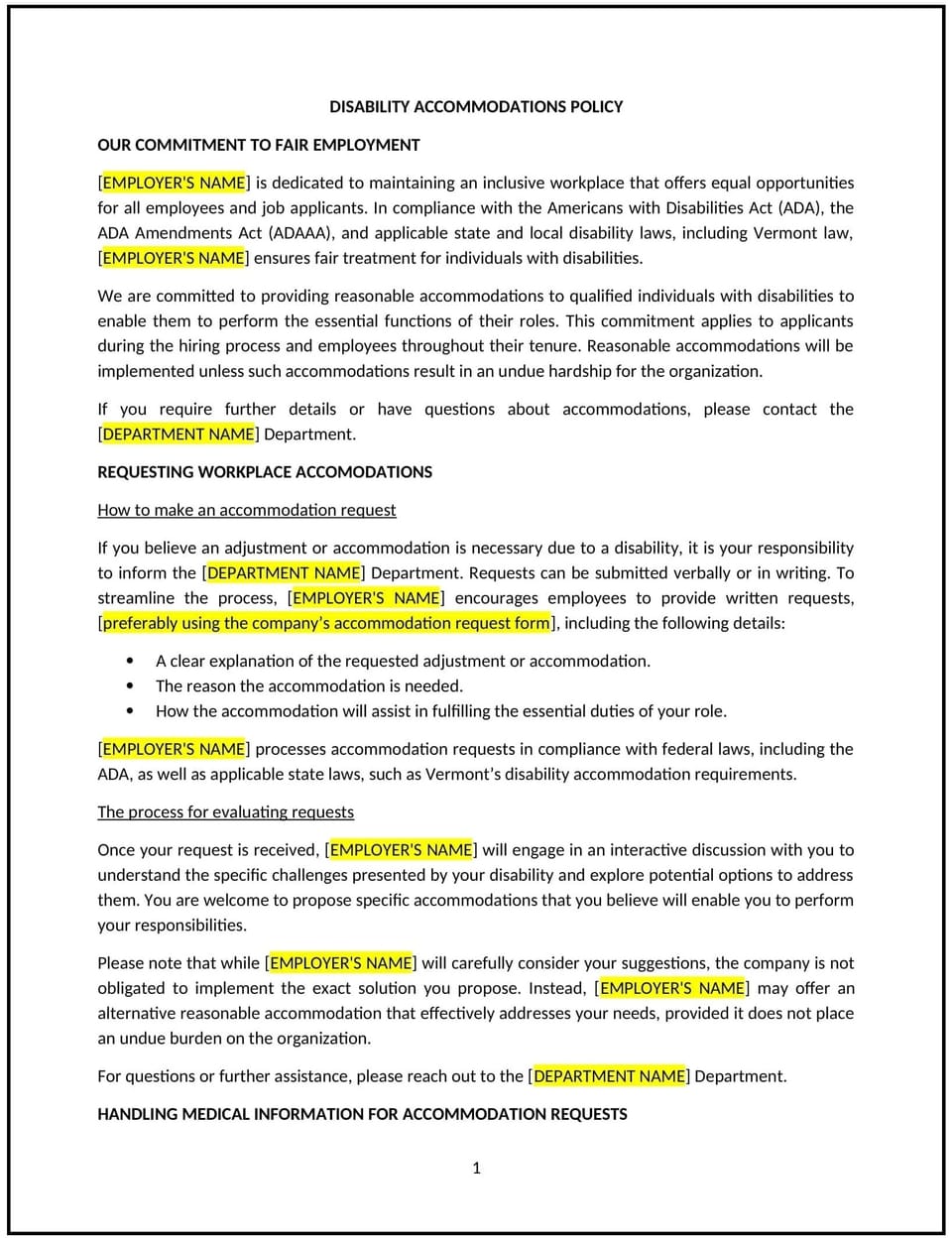Disability accommodations policy (Vermont): Free template

Disability accommodations policy (Vermont)
This disability accommodations policy is designed to help Vermont businesses comply with the Americans with Disabilities Act (ADA) and Vermont’s Fair Employment Practices Act (VFEPA). It provides guidelines for requesting, evaluating, and implementing workplace accommodations for employees with disabilities.
By adopting this policy, businesses can foster an inclusive workplace, enhance employee productivity, and improve compliance with Vermont and federal laws.
How to use this disability accommodations policy (Vermont)
- Define reasonable accommodations: Specify the types of adjustments or modifications available, such as flexible schedules, assistive technologies, or facility modifications.
- Outline the request process: Provide clear instructions for employees to request accommodations, including whom to contact and what information to provide.
- Include evaluation procedures: Detail how accommodation requests will be assessed, including an interactive process to identify effective solutions.
- Emphasize confidentiality: Assure employees that all medical and disability-related information will be handled confidentially and stored securely.
- Address undue hardship: Clarify that accommodations may not be provided if they impose significant difficulty or expense on the business, as defined by law.
- Promote training: Educate managers and HR staff on handling accommodation requests and supporting employees with disabilities.
- Monitor compliance: Regularly review accommodations and workplace practices to ensure alignment with Vermont laws and evolving employee needs.
Benefits of using this disability accommodations policy (Vermont)
This policy provides several benefits for Vermont businesses:
- Promotes inclusivity: Creates a supportive environment for employees with disabilities to thrive.
- Enhances compliance: Aligns with ADA and VFEPA requirements, reducing legal risks.
- Improves retention: Supports employees in maintaining employment by addressing their unique needs.
- Boosts productivity: Helps employees with disabilities perform their roles effectively through tailored accommodations.
- Demonstrates commitment: Reflects the company’s dedication to diversity and equal opportunities.
Tips for using this disability accommodations policy (Vermont)
- Communicate the policy: Share the policy with employees during onboarding and include it in the employee handbook.
- Encourage open dialogue: Foster a workplace culture where employees feel comfortable discussing their accommodation needs.
- Provide resources: Offer access to tools and technologies that support employees with disabilities.
- Track accommodations: Maintain records of accommodation requests, decisions, and implementations to ensure accountability and compliance.
- Update regularly: Revise the policy to reflect changes in Vermont laws, workplace needs, or best practices.
Q: What is considered a reasonable accommodation under this policy?
A: Reasonable accommodations may include flexible work schedules, assistive devices, ergonomic equipment, or facility modifications to support employees with disabilities.
Q: How can employees request accommodations?
A: Employees should contact HR or a designated manager and provide relevant information about their needs and the requested accommodations.
Q: Are accommodation requests confidential?
A: Yes, all medical and disability-related information is kept confidential and shared only with those directly involved in the accommodation process.
Q: What happens if an accommodation request cannot be granted?
A: If an accommodation imposes an undue hardship on the business, alternatives will be explored through an interactive process with the employee.
Q: Are managers trained to handle accommodation requests?
A: Yes, managers and HR staff receive training on supporting employees with disabilities and addressing accommodation requests effectively.
Q: How often is this policy reviewed?
A: This policy is reviewed annually or whenever significant changes occur in Vermont laws or workplace practices.
Q: Does this policy apply to job applicants?
A: Yes, reasonable accommodations are provided to qualified job applicants with disabilities during the hiring process.
Q: Can an accommodation request be denied?
A: Requests may be denied if they impose undue hardship on the business, but alternative solutions will be considered wherever possible.
This article contains general legal information and does not contain legal advice. Cobrief is not a law firm or a substitute for an attorney or law firm. The law is complex and changes often. For legal advice, please ask a lawyer.


